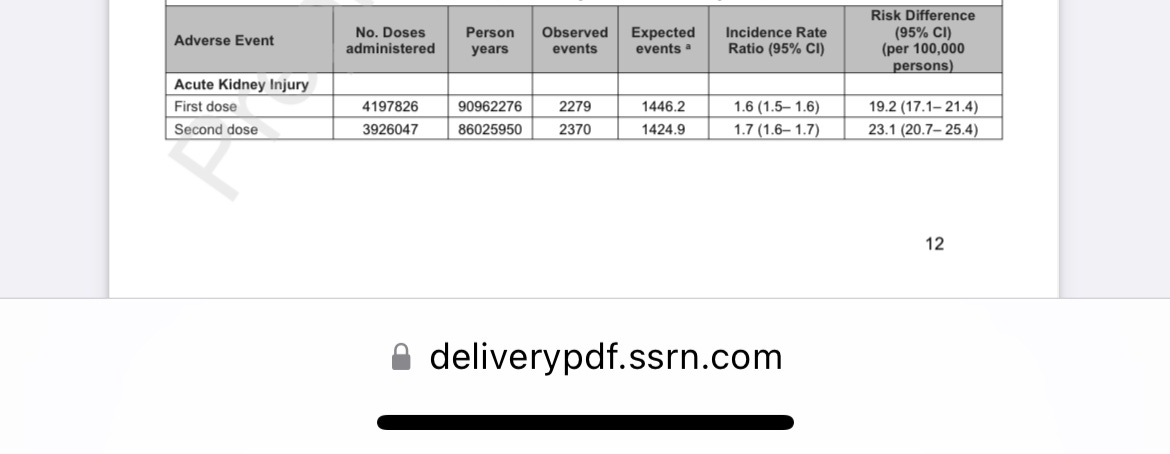
URGENT: A big New Zealand study reveals high rates of kidney injury after the Pfizer jab
1,800 more cases than expected followed the shots, one for every 2,200 completed vaccinations; the finding is more evidence that the jabs may cause cardiovascular damage.
Drawing on a national database of over four million people, researchers in New Zealand have found a strong association between Pfizer’s mRNA Covid shot and kidney injuries.
In the three weeks after a mRNA jab, the risk of acute kidney injury rose 60 percent, the researchers found. They reported almost 1,800 extra cases – the equivalent of over 100,000 extra cases of kidney injury in the United States.
The finding was posted as a “preprint” in The Lancet’s database on Friday, Jan. 20. It is the third signal from a large government-managed database linking the Pfizer’s mRNA shots to serious side effects in only the last six weeks.
(There’s nothing cute about kidney injuries! 2279+2370-1446-1425=A LOT. Or 1778, to be specific.)

The authors did not define “acute kidney injury,” a term that can cover anything from relatively benign changes on laboratory tests to a serious loss of renal function.
Still, the finding is yet another signal of the potential cardiovascular risks of the mRNAs. The kidneys essentially function as filters for the blood, and renal injuries often result from reduced blood flow to the kidneys.
The researchers also found elevated rates of heart inflammation, blood clots, and platelet damage in the weeks after one or both of the shots. In all, they found a statistical link between the Pfizer shot for four of the 12 conditions they examined.
The finding is particularly strong because the researchers did not have to depend on voluntary reporting. Instead, they compared New Zealand’s national health records to its national database of people over five who received the vaccine. Just over 4 million New Zealanders, including 95 percent of adults and teenagers, received the shots, providing a large pool to track.
The researchers then compared the number of “adverse events” they found to historical background rates.
In addition, New Zealand had relatively low rates of Covid for most of the period during which people received the Pfizer jabs, so Covid itself cannot be blamed for the excess injuries.
Four of the five researchers on the paper work for the New Zealand government, which has avidly promoted the shots. It is probably only coincidence that they opened their discussion of the findings with the good news: “BNT162b2 vaccination was not found to be associated with the majority of the selected AESIs. [adverse events of special interest].”
Yes, the Pfizer jab was associated with only some of the possible side effects the researchers examined, not every single one.
Look on the bright side, people.
************
Source

••••
The Liberty Beacon Project is now expanding at a near exponential rate, and for this we are grateful and excited! But we must also be practical. For 7 years we have not asked for any donations, and have built this project with our own funds as we grew. We are now experiencing ever increasing growing pains due to the large number of websites and projects we represent. So we have just installed donation buttons on our websites and ask that you consider this when you visit them. Nothing is too small. We thank you for all your support and your considerations … (TLB)
••••
Comment Policy: As a privately owned web site, we reserve the right to remove comments that contain spam, advertising, vulgarity, threats of violence, racism, or personal/abusive attacks on other users. This also applies to trolling, the use of more than one alias, or just intentional mischief. Enforcement of this policy is at the discretion of this websites administrators. Repeat offenders may be blocked or permanently banned without prior warning.
••••
Disclaimer: TLB websites contain copyrighted material the use of which has not always been specifically authorized by the copyright owner. We are making such material available to our readers under the provisions of “fair use” in an effort to advance a better understanding of political, health, economic and social issues. The material on this site is distributed without profit to those who have expressed a prior interest in receiving it for research and educational purposes. If you wish to use copyrighted material for purposes other than “fair use” you must request permission from the copyright owner.
••••
Disclaimer: The information and opinions shared are for informational purposes only including, but not limited to, text, graphics, images and other material are not intended as medical advice or instruction. Nothing mentioned is intended to be a substitute for professional medical advice, diagnosis or treatment.






Leave a Reply